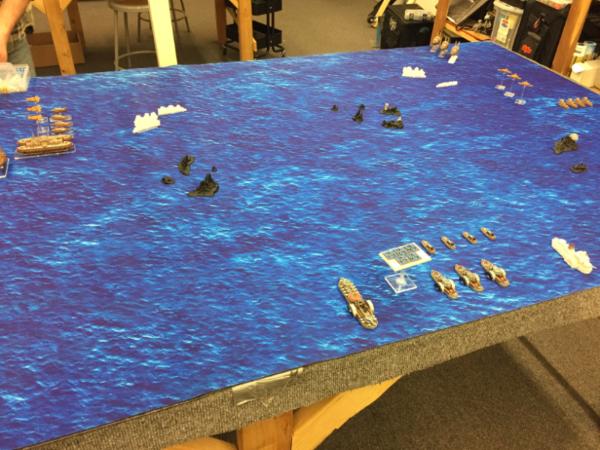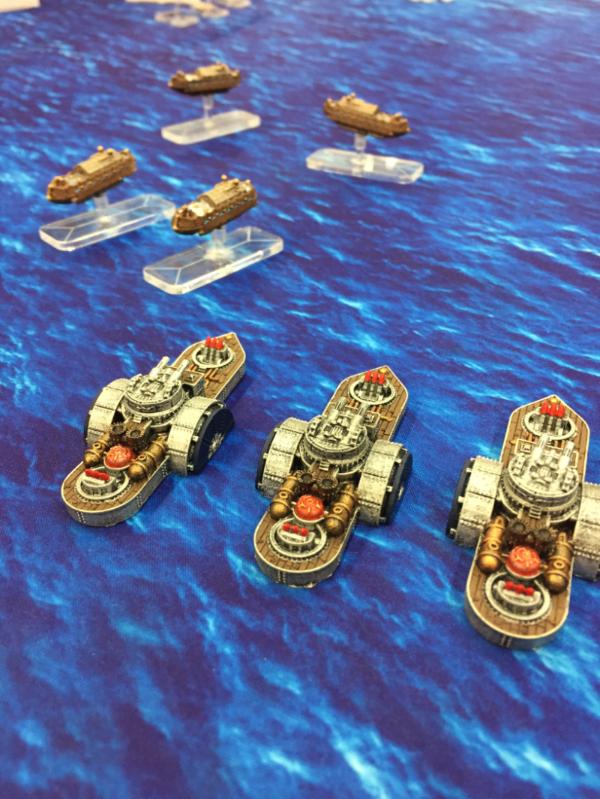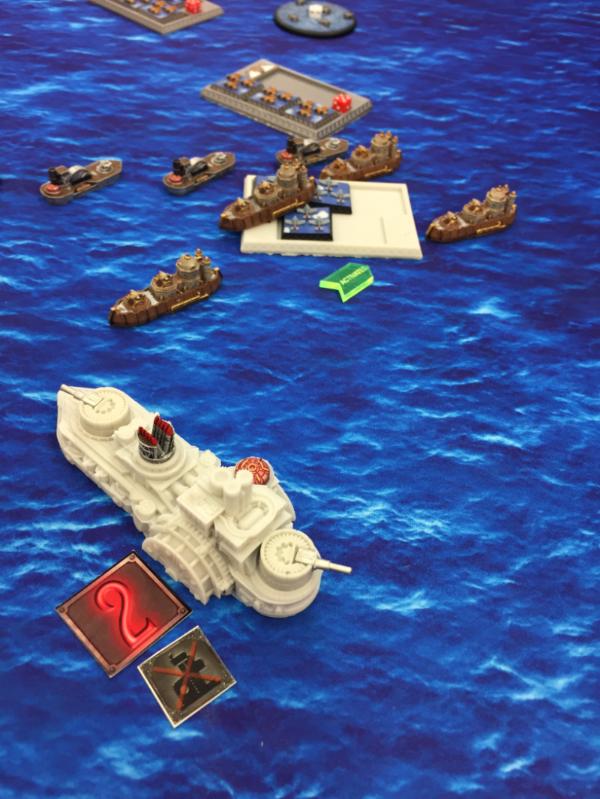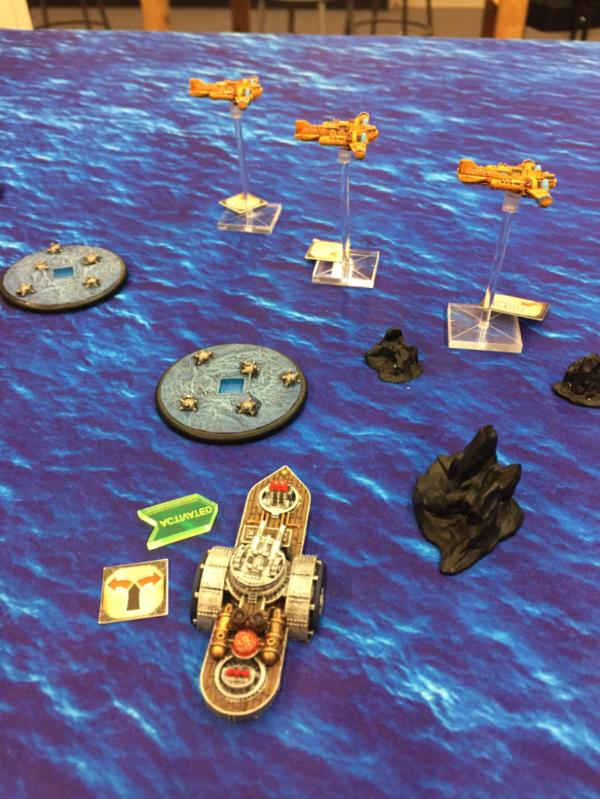Aboard his flagship, Abdulhamid considered his three most senior squadron leaders. He gazed at each one in turn, silently considering his next command. Abdulhamid had already turned his victorious fleet back towards the Dardanelles, and had dispatched radio messages to the Sultan in regards to Elmaleh's capture. As he predicted, the Sultan instructed Abdulhamid to retrieve the French captain. However, surprisingly the Sultan also requested that ships be sent to harass the crippled American dreadnaught.
Abdulhamid turned to Captain Ali Pasha, who commanded the battleship “Storm's Fury” and had stayed behind directing the reserve fleet. Asking for confirmation if the boost generators were in working order, his mind was made. Ali Pasha would take the fastest ships from the reserve fleet, with the most aggressive crew, and attempt to hunt down and rescue Elmaleh. Meanwhile, Abdulhamid’s first officer would command a small raiding flotilla to harass the Americans all the way back to Gibraltar.
200 miles to the west, Admiral McInerny was plotting his own next move. The unexpected capture of the corsair Elmaleh during the fight at the oil rigs was both a blessing and a curse. A blessing, in that Elmaleh would likely yield valuable intelligence on enemy naval movements in the eastern Mediterranean; a curse, in that Istanbul was almost certain to send a rescue mission to retrieve the Frenchman from his American captors.
After the disaster at the mouth of the Nile, Elmaleh had been spirited away from the battlefield in a fast cruiser to Sidi Barrani in western Egypt, where the FSA had a small outpost. He had been locked in the brig while the remainder of McInerny's battle fleet retired from the Nile Delta area and regrouped outside Sidi Barrani's anchorage. Under orders from Washington to get the Frenchman to Gibraltar with all due haste, McInerny was considering his options. Luckily, a small American task force was already in port at Sidi Barrani, having arrived there some weeks earlier to conduct training with their Egyptian counterparts. McInerny had ordered kinetic generators installed on the larger ships and was writing out orders for Captain Obadiah Samuels, the task force commander.
Abdulhamid did not like the risk of committing more ships than he deemed necessary, but the Sultan’s will be done...Forum member Quickdraw and I met up a few weeks ago to play the next chapter in our loose Mediterranean campaign. This game would see the FSA rushing Elmaleh to Gibralter, with the Ottomans ambushing them along the way. I built a fleet with speed in mind--almost everything I put on the table had a kinetic generator.
This was designed to be a small game. The FSA would deploy in a tight formation in the middle of one long edge of the table, with the Ottomans coming in from both flanks. Elmaleh was being held on one of the FSA Princeton-class gunships; I put a mark on the bottom of the ship where he was imprisoned. Quickdraw knew which squadron Elmaleh was in, but not which ship, and would have to conduct a boarding action to find the French corsair captain. The FSA's job was solely to get the ship with Elmaleh onboard across the table and off the other side.
Sounds simple enough, right? To quote the Arbiter from Halo 3: "Were it so easy."
The setup:



Turn one went well enough. The FSA battlecruiser even managed to splash one of the Ottoman flying minelayers. Long range fire went back and forth as the FSA sped up the channel.
Then...everything went sideways.
In turn 2, the Ottoman frigates lined up directly in the path of the oncoming FSA gunships. Quickdraw elected to split up their fire, two concentrating on the left flank gunship and two concentrating on the center gunship. His idea, I believe, was to soften them up before attempting a boarding action.

Unbeknownst to both of us, those gun crews were probably the most highly trained and highly motivated in the entire Ottoman navy.
The gunship on the left flank received 21 hits--three criticals. She sank directly. The gunship in the middle received a crippling critical hit--but the result was double sixes. When Quickdraw rolled for the number of HP to remove as a result of the crit, he rolled a six. The gunship sank--taking Elmaleh with it.
We laughed. And laughed, and laughed, and laughed. I think I had tears streaming down my face at one point, guffawing over the absurdity of it all.
The rest of the battle became a mopping-up action, as the remaining FSA forces attempted to flee to Gibraltar. It wasn't pretty.


In the end, no American capital ships remained, and only a few of the smaller ships were still afloat. The Ottomans had had their nose bloodied, but that was about it.
Stay tuned in early 2018 for the next installment of this unfolding campaign! And thanks for reading!
McInerny could scarcely believe his eyes as he read the after action report. His first thought was that Abdulhamid was irrefutably crazy, but as his temper cooled he realized it was likely a serious tactical error committed by an inexperienced squadron commander. Elmaleh was, after all, being held aboard a Princeton-class gunship, and the Princeton's kinetic generator was known to have containment issues. By all accounts of the (few) surviving task force ships, two of the fast gunships simply vaporized under a hail of broadside fire from the Ottoman frigates. The sound had been deafening, shattering porthole and bridge windows a quarter mile away.
On the one hand, McInerny thought, Elmaleh had gotten what he deserved, having thrown his lot in with the Sultan's forces. On the other hand, he was looking forward to exploiting whatever information they would have pulled out of the French captain--information they now would never get. And what would this mean for the Franco-Ottoman alliance in the Mediterranean?
The news of Elmaleh’s death reached Abdulhamid before Ali Pasha was able to explain himself. A small fusillade from the frigates had punctured the sturginum-fueled generators on the gunship, detonating it before the hulk mysteriously disappeared entirely. The foolish frigate squadron commander at least had the good sense to get himself killed shortly afterwards, saving himself the embarrassment of having to explain why he had inadvertently obliterated their ally. Luckily for Ali Pasha, Abdulhamid was a gracious leader, and there was some saving grace in the thrashing that the Americans took in the engagement; five capital ships destroyed including one of the new battlecruisers.
The Sultan was not made aware of the disaster. Abdulhamid sought to be on dry ground before sending that dispatch. Hopefully the diplomats would be able to smooth over any trouble. But French corsairs could not be trusted to obey their leaders or government if they felt a blood price needed to be paid.